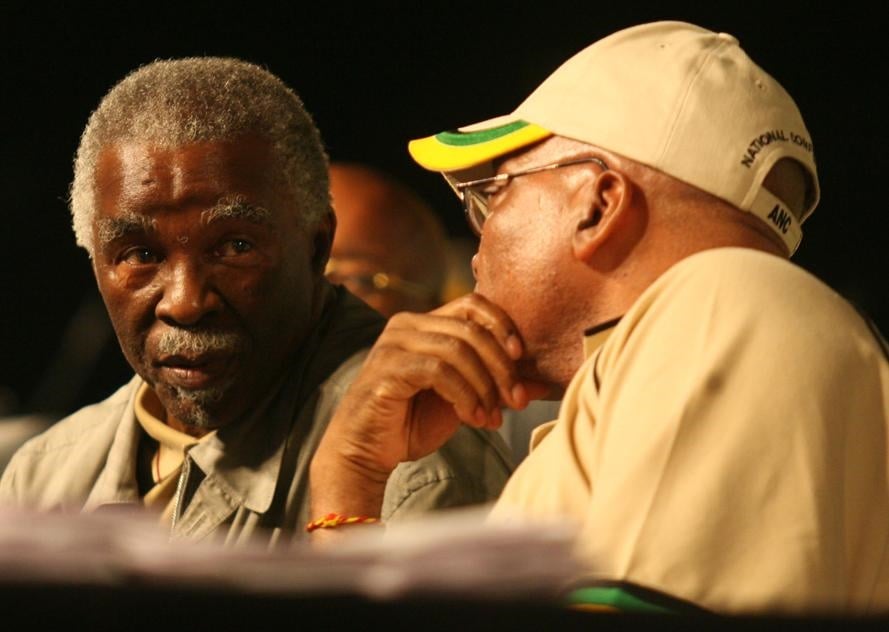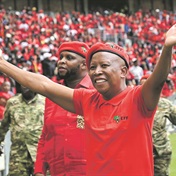
Former President Thabo Mbeki just stopped short of saying it, but he actually did say it: the ascension of his successor, Jacob Zuma, to the highest office in the land was a counterrevolutionary act engineered by elements of the old apartheid order. And, the destruction he wrought on the country during his nine years in power was in pursuance of this counterrevolutionary agenda to make democratic South Africa fail.
This alleged counterrevolution, of which Zuma was a key player, “has caused enormous damage to the country as a whole and brought much suffering to millions of our people,” Mbeki said.
Mbeki, speaking at the 30 years of democracy celebration at Freedom Park in Tshwane this week, pulled no punches as he painted a picture of a Zuma who was a pliant collaborator in a plot to reverse the gains of democracy.
In his speech, Mbeki spoke of two phases of post-apartheid South Africa. Quoting generously from John Endress, the CEO of the Institute of Race Relations, Mbeki spoke of the first 13 to 15 years of South Africa (1994–2008) as marked by progress and the time since then until 2022 as being marked by decline.
In his speech to the influential Cato Institute think tank in Washington last year, Endress divided South Africa’s post-apartheid trajectory into Age One and Age Two. The first approximates the Nelson Mandela and Mbeki years, when things were looking very positive for the country, and the second is essentially the years and the hangover from that period. Mbeki said, quoting extensively from various international and local official sources:
Pointedly, Mbeki stated that the “sharp difference” between the two ages “poses the question – why? An answer to this question becomes especially important because, during both ages, the ANC was the major governing party”.
Mbeki took his audience down history lane, essentially saying that bittereinders from the older had heavily infiltrated the ANC. He said the “counter-revolution” began planning to take over the ANC in 2007 as early as the ANC’s 2002 national conference in Stellenbosch.
READ: A repeat of July 2021 unrest will not be allowed, Cabinet says of threats ahead of elections
“The 2007 National Conference presented the counter-revolution with the opportunity to implement its plans in this regard. It therefore participated both in the preparations and the Conference itself to ensure the success of those it favoured as members of the ANC national executive committee,” the former president said.
That was the conference when Zuma was elected the ANC president, with the NEC being dominated by many of his allies.
Dropping a very obvious hint, Mbeki stated “the apartheid regime had paid a lot of attention to the task to infiltrate as many of its agents as possible into the ANC and the rest of the broad democratic movement. Though much was done by the ANC to discover and expose these enemy agents, the hard reality is that a considerable number of these remained undetected within our ranks”.
Mbeki did not explicitly say so but the butter was laid on very thick. In his speech, Mbeki threaded the history of the Afrikaner establishment’s fear of communism and (wrongly) how the ANC could be used as a vassal for this ideology’s penetration into South Africans. For this reason, Mbeki said the apartheid establishment had to pull out all stops to prevent the ANC from coming into power and if it ever came into power, it had to be prevented from fulfilling its objectives.
Mbeki’s history thread included the fact that in 1994, the incoming had asked the police, the defence force and the intelligence service for the names of the agents who had infiltrated the liberation movement “so that we could discuss and demobilise them”.
“Effectively, all three services turned down our request. The counter-revolution used these agents in the ranks of the ANC to intervene in the Polokwane National Conference as it did,” Mbeki alleged. So was Zuma, the main beneficiary of the Polokwane conference, one of them? Mbeki did not explicitly say, but the implication was very clear.
READ: ‘Ill-disciplined’ Zuma dares Cyril and ANC, sparking fury from some NEC members
As he did in a recent speech, Mbeki cited the destruction of Eskom, Sars and other entities by Zuma and his coterie as an example of the counter-revolution at work. He detailed the findings of the Zondo and Nugent judicial commissions, quoting now Chief Justice Raymond saying that “this is one of the few instances where President Zuma was himself directly and personally involved in the activities and plans to take over a government entity…”
“Obviously, this confronts us with a conundrum! Here, according to the judicial commissions, we have a head of government who joins a process to reduce the very revenues he needs to enable the government to discharge its responsibilities, up to the point of the possible collapse of that government. How do we explain this puzzle? The only logical way to explain this is that, challenging as this might be even to comprehend. Here we are dealing with a wolf in sheep’s skin!”
Basically, Zuma was not operating alone. He was serving his masters from time old.
He went on to recount the destruction of institutions such as the SA Police Service, the National Prosecuting Agency and many state-owned enterprises by people put in charge by Zuma as more examples of this counterrevolution at play. Then there were the July 2021 riots, which Mbeki deemed “a practical exercise by the counter-revolution to test its ability to destabilise the country.”
To drive his point, he quotes former SA Army deputy general Roland de Vries, who last month warned that the state still could not prevent a similar event. De Vries stated in an interview that the July 2021 mayhem “was to my mind a well-orchestrated (counter)-revolutionary threat which materialised as if by signal, as if by magic…”
There is also the part that his own leadership had alienated so many in the ANC’s ranks that the governing party became ripe for the buffoon to take over. But the argument that the destruction of South Africa by Zuma will land well in some quarters, seeing it carries the weight of a former president. It has certainly got tongues wagging in the ANC, where the emergence of the MK Party is being seen as an extension of this “counterrevolutionary project”.
So, in effect, Zuma is still carrying out important tasks for the masters he once served. It has been said but not quite said. A lot to chew on.




 Publications
Publications
 Partners
Partners









